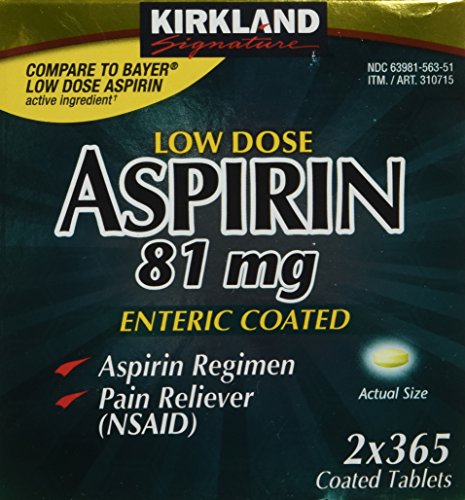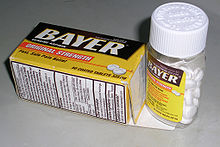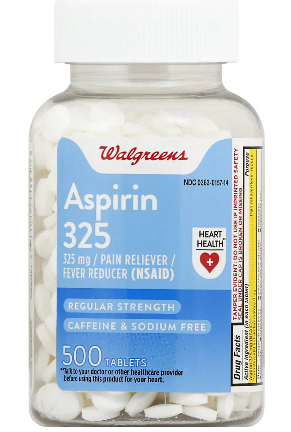Aspirin, also known as acetylsalicylic acid (ASA), is a salicylate medication, often used to treat pain, fever, and inflammation.
Aspirin, also known by its generic name acetylsalicylic acid, is a common over-the-counter medication that belongs to the class of drugs known as nonsteroidal anti-inflammatory drugs (NSAIDs). It is widely used for its analgesic (pain-relieving), antipyretic (fever-reducing), and anti-inflammatory properties.

Aspirin works by inhibiting the activity of an enzyme called cyclooxygenase (COX). This enzyme is involved in the production of prostaglandins, which are substances that play a role in inflammation, pain, and fever. By reducing the production of prostaglandins, aspirin helps alleviate pain, reduce fever, and exert anti-inflammatory effects.
In addition to its common use for relieving minor aches and pains, aspirin is also known for its cardiovascular benefits. Low-dose aspirin is often prescribed to help prevent heart attacks and strokes in certain individuals, as it can inhibit the formation of blood clots.
Aspirin also has an antiplatelet effect by stopping the binding together of platelets and preventing a patch over damaged walls of blood vessels. Aspirin is also used long-term, at low doses, to help prevent heart attacks, strokes, and blood clot formation in people at high risk of developing blood clots. Low doses of aspirin may be given immediately after a heart attack to reduce the risk of another heart attack or of the death of cardiac tissue. Aspirin may be effective at preventing certain types of cancer, particularly colorectal cancer.
The main side effects of aspirin are gastric ulcers, stomach bleeding, and ringing in the ears, especially with higher doses. While daily aspirin can help prevent a clot-related stroke, it may increase risk of a bleeding stroke (hemorrhagic stroke). In children and adolescents, aspirin is not recommended for flu-like symptoms or viral illnesses, because of the risk of Reye’s syndrome.
Aspirin is part of a group of medications called nonsteroidal anti-inflammatory drugs (NSAIDs), but differs from most other NSAIDs in the mechanism of action. The salicylates have similar effects (antipyretic, anti-inflammatory, analgesic) to the other NSAIDs and inhibit the same enzyme cyclooxygenase (COX), but aspirin does so in an irreversible manner and, unlike others, affects the COX-1 variant more than the COX-2 variant of the enzyme.
The therapeutic properties of willow tree bark have been known for at least 2,400 years, with Hippocrates prescribing it for headaches.[12] Salicylic acid, the active ingredient of aspirin, was first isolated from the bark of the willow tree in 1763 by Edward Stone of Wadham College, University of Oxford. Felix Hoffmann, a chemist atBayer, is credited with the synthesis of aspirin in 1897, though whether this was of his own initiative or under the direction of Arthur Eichengrün is controversial.
Aspirin is one of the most widely used medications in the world with an estimated 40,000 tonnes of it being consumed each year. In countries where “Aspirin” is a registered trademark owned by Bayer, the generic term is acetylsalicylic acid (ASA). It is on the WHO Model List of Essential Medicines, the most important medications needed in a basic health system.
Other names: Benzoic acid, 2-(acetyloxy)-; Salicylic acid acetate; o-Acetoxybenzoic acid; o-Carboxyphenyl acetate; A.S.A.; A.S.A. Empirin; Acenterine; Acesal; Acetal; Aceticyl; Acetilum Acidulatum; Acetisal; Acetol; Acetophen; Acetosal; Acetosalic acid; Acetosalin; Acetylin; Acetylsal; Acetylsalicylic acid; Acidum acetylsalicylicum; Acisal; Acylpyrin; Asagran; Aspro; Asteric; AC 5230; ASA; Benaspir; Bialpirina; Colfarit; Dolean PH 8; Duramax; Ecotrin; Empirin; Endydol; Enterophen; Enterosarein; Enterosarine; Globentyl; Globoid; Helicon; Idragin; Measurin; Neuronika; Novid; Polopiryna; Rheumintabletten; Rhodine; Rhonal; Salacetin; Salcetogen; Saletin; SP 189; Temperal; Triple-Sal; Xaxa; Yasta; 2-(Acetyloxy)benzoic acid; 2-Acetoxybenzoic acid; 2-Carboxyphenyl acetate; O-acetylsalicylic acid; Acetonyl; Acetylsalicylsaure; Acide acetylsalicylique; Adiro; Aspec; Aspergum; Aspirdrops; Aspirine; Bi-prin; Cemirit; Claradin; Clariprin; Crystar; Decaten; Ecolen; Entericin; Extren; ECM; Levius; Micristin; Pharmacin; Pirseal; Premaspin; S-211; Solfrin; Solprin acid; Spira-Dine; St. Joseph; Acetilsalicilico; Acido acetilsalicilico; Acimetten; Acido O-acetil-benzoico; Asatard; Aspalon; Bialpirinia; Caprin; Contrheuma retard; Delgesic; Entrophen; Kyselina 2-acetoxybenzoova; Kyselina acetylsalicylova; Solpyron; Bayer; Bufferin; Easprin; St. Joseph Aspirin for Adults; 2-Acetylsalicyclic acid; Ascoden-30; Coricidin; Nu-seals; Nu-seals aspirin; Persistin; Supac; Tasprin; Triaminicin; Salicylic acid, acetyl-; o-(Acetyloxy)benzoic acid; Zorprin; Magnecyl; Miniasal; Colsprin; Acesan; Acetard; Ascolong; Aspropharm; Salycylacetylsalicylic acid; Kapsazal
How Does Aspirin Work ?
Aspirin works by inhibiting the activity of an enzyme called cyclooxygenase (COX). There are two main isoforms of this enzyme: COX-1 and COX-2. These enzymes are involved in the production of substances called prostaglandins from a precursor called arachidonic acid.
Prostaglandins play a key role in various physiological processes, including inflammation, pain, and fever. They are lipid compounds that act as signaling molecules in the body. By inhibiting the activity of COX, aspirin reduces the production of prostaglandins, leading to its therapeutic effects.
Here’s a more detailed breakdown of how aspirin works:
- Inhibition of COX Enzymes: Aspirin irreversibly acetylates (adds an acetyl group to) the COX enzymes, particularly COX-1 and COX-2. This acetylation prevents the enzymes from carrying out their normal function.
- Reduction of Prostaglandin Synthesis: COX enzymes catalyze the conversion of arachidonic acid into prostaglandins. Prostaglandins are involved in promoting inflammation, sensitizing nerve endings to pain, and regulating body temperature. By inhibiting COX, aspirin decreases the production of prostaglandins.
- Anti-Inflammatory Effects: Since many inflammatory responses are mediated by prostaglandins, the reduction in prostaglandin synthesis leads to anti-inflammatory effects. This is why aspirin is effective in relieving inflammation in conditions such as arthritis.
- Analgesic (Pain-Relieving) Effects: Prostaglandins sensitize nerve endings to pain, and by reducing their production, aspirin helps alleviate pain.
- Antipyretic (Fever-Reducing) Effects: Prostaglandins also play a role in regulating body temperature, and their reduction by aspirin contributes to its antipyretic effects.
Chemical Properties of Aspirin
Aspirin, chemically known as acetylsalicylic acid, has specific chemical properties that contribute to its pharmacological effects. Here are some key chemical properties of aspirin:
- Chemical Structure: The chemical structure of aspirin consists of a salicylate (salicylic acid) moiety with an acetyl group attached. The chemical formula for aspirin is C9H8O4.
- Functional Groups: Aspirin contains two important functional groups: a carboxylic acid group (-COOH) and an ester group (-COOCH3). The carboxylic acid group is responsible for its acidity, and the ester group is derived from the acetylation of the hydroxyl group in salicylic acid.
- Synthesis: Aspirin is commonly synthesized through the acetylation of salicylic acid with acetic anhydride. The reaction produces acetylsalicylic acid and acetic acid as byproducts.
- Acidity: Aspirin is a weak acid due to the presence of the carboxylic acid group. In aqueous solutions, it can ionize to release hydrogen ions (H+).
- Solubility: Aspirin is sparingly soluble in water but soluble in organic solvents like ethanol and acetone. This property influences its absorption and distribution in the body.
- Stability: Aspirin is relatively stable under normal storage conditions. However, it can undergo hydrolysis in the presence of moisture, leading to the release of salicylic acid. To maintain its stability, aspirin is often stored in a dry environment.
- Irreversible Inhibition: Aspirin’s pharmacological effects stem from its ability to irreversibly inhibit the cyclooxygenase (COX) enzyme, particularly COX-1 and COX-2, by acetylating a serine residue in the enzyme’s active site.
- Acetylation of COX: The acetyl group in aspirin is crucial for its mechanism of action. It forms a covalent bond with the serine residue in the COX enzyme, preventing the conversion of arachidonic acid into prostaglandins.
Medical Use of Aspirin
Aspirin is used in the treatment of a number of conditions, including fever, pain, rheumatic fever, and inflammatory diseases, such as rheumatoid arthritis, pericarditis, andKawasaki disease. Lower doses of aspirin have also shown to reduce the risk of death from a heart attack, or the risk of stroke in some circumstances. There is some evidence that aspirin is effective at preventing colorectal cancer, though the mechanisms of this effect are unclear.
Aspirin has several medical uses due to its pharmacological properties, including its ability to reduce pain, inflammation, fever, and blood clot formation. Here are some common medical uses of aspirin:
- Pain Relief (Analgesic): Aspirin is widely used to relieve mild to moderate pain, such as headaches, muscle aches, toothaches, and menstrual cramps. It works by inhibiting the production of prostaglandins, which sensitize nerve endings to pain.
- Anti-Inflammatory Effects: Aspirin has anti-inflammatory properties and is often used to reduce inflammation associated with conditions such as arthritis, rheumatoid arthritis, and other inflammatory disorders.
- Fever Reduction (Antipyretic): Aspirin helps reduce fever by lowering the body’s temperature set point in the brain. This makes it effective in managing fever associated with various illnesses.
- Cardiovascular Protection: Low-dose aspirin is prescribed for certain individuals to reduce the risk of cardiovascular events, such as heart attacks and strokes. It does so by inhibiting the formation of blood clots. This use is often recommended for people with a history of heart attack, stroke, or certain cardiovascular conditions.
- Prevention of Blood Clots: Aspirin’s antiplatelet effects make it useful in preventing the formation of blood clots. It is sometimes prescribed to individuals at risk of thrombotic events, such as those with a history of blood clotting disorders or certain cardiovascular conditions.
- Preeclampsia Prevention: In some cases, aspirin may be recommended to pregnant women at risk of developing preeclampsia, a condition characterized by high blood pressure and organ damage. Aspirin’s antiplatelet and anti-inflammatory effects are thought to contribute to its potential preventive benefits.
- Reduction of Colorectal Cancer Risk: Some studies suggest that long-term use of aspirin may be associated with a reduced risk of developing colorectal cancer. However, the use of aspirin for cancer prevention is a topic of ongoing research and is not universally recommended.
1. Aspirin is Used for Pain Relief

Aspirin 325 mg / 5 grains for pain

Uncoated aspirin tablets, consisting of about 90% acetylsalicylic acid, along with a minor amount of inert fillers and binders
Aspirin is an effective analgesic for acute pain, but is generally considered inferior to ibuprofen for the alleviation of pain because aspirin is more likely to causegastrointestinal bleeding. Aspirin is generally ineffective for those pains caused by muscle cramps, bloating, gastric distension, or acute skin irritation. As with other NSAIDs, combinations of aspirin and caffeine provide slightly greater pain relief than aspirin alone. Effervescent formulations of aspirin, such as Alka-Seltzer or Blowfish, relieve pain faster than aspirin in tablets, which makes them useful for the treatment of migraines. Topical aspirin may be effective for treating some types of neuropathic pain.
2. Aspirin is Used for Headache Relief
Aspirin, either by itself or in a combined formulation, effectively treats some types of headache, but its efficacy may be questionable for others. Secondary headaches, meaning those caused by another disorder or trauma, should be promptly treated by a medical provider.
Among primary headaches, the International Classification of Headache Disorders distinguishes between tension headache (the most common), migraine, and cluster headache. Aspirin or other over-the-counter analgesics are widely recognized as effective for the treatment of tension headache.
Aspirin, especially as a component of an acetaminophen/aspirin/caffeine, is considered a first-line therapy in the treatment of migraine, and comparable to lower doses ofsumatriptan. It is most effective at stopping migraines when they are first beginning.
3. Aspirin is Used for Fever Reducer
Like its ability to control pain, aspirin’s ability to control fever is due to its action on the prostaglandin system through its irreversible inhibition of COX. Although aspirin’s use as an antipyretic in adults is well-established, many medical societies and regulatory agencies (including the American Academy of Family Physicians, the American Academy of Pediatrics, and the U.S. Food and Drug Administration (FDA)) strongly advise against using aspirin for treatment of fever in children because of the risk ofReye’s syndrome, a rare but often fatal illness associated with the use of aspirin or other salicylates in children during episodes of viral or bacterial infection.Because of the risk of Reye’s syndrome in children, in 1986, the FDA required labeling on all aspirin-containing medications advising against its use in children and teenagers.
4. Aspirin is Used for Inflammation
Aspirin is used as an anti-inflammatory agent for both acute and long-term inflammation, as well as for treatment of inflammatory diseases, such as rheumatoid arthritis.
5. Aspirin is Used for Heart attacks and strokes
Aspirin is an important part of the treatment of those who have had a myocardial infarction (heart attack). One trial found that among those likely having a ST-segment elevation MI, aspirin saves the life of 1 in 42 by reducing the 30-day death rate from 11.8% to 9.4%. There was no difference in major bleeding, but there was a small increase in minor bleeding amounting to roughly 1 in every 167 people given aspirin.
Precautions of Taking Aspirin
Before taking aspirin, tell your doctor or pharmacist if you are allergic to it; or to other salicylates (such as choline salicylate); or to NSAIDs (such as ibuprofen, naproxen); or if you have any other allergies. This product may contain inactive ingredients, which can cause allergic reactions or other problems. Talk to your pharmacist for more details.
Before using this medication, tell your doctor or pharmacist your medical history, especially of: aspirin-sensitive asthma (a history of worsening breathing with runny/stuffy nose after taking aspirin or other NSAIDs), bleeding/blood problems (such as hemophilia, vitamin K deficiency, low platelets), kidney disease, liver disease, stomach problems (such as ulcers, heartburn), growths in the nose (nasal polyps).
This medicine may cause stomach bleeding. Daily use of alcohol and tobacco while using this medicine may increase your risk for stomach bleeding. Limit alcohol and stop smoking. Ask your doctor or pharmacist about how much alcohol you may safely drink.
Before having surgery, tell your doctor or dentist about all the products you use (including prescription drugs, nonprescription drugs, and herbal products).
This drug contains aspirin. Children and teenagers younger than 18 should not take aspirin if they have chickenpox, flu, or any undiagnosed illness or if they have recently received a vaccine. In these cases, taking aspirin increases the risk of Reye’s syndrome, a rare but serious illness.
Older adults may be more sensitive to the side effects of this drug, especially stomach/intestinal bleeding and ulcers.
Aspirin is not recommended for use to treat pain or fever during pregnancy. Before using this medication, women of childbearing age should talk with their doctor(s) about the benefits and risks. Tell your doctor if you are pregnant or if you plan to become pregnant. This medication may harm an unborn baby and cause problems with normal labor/delivery. It is not recommended for use in pregnancy from 20 weeks until delivery. If your doctor decides that you need to use this medication between 20 and 30 weeks of pregnancy, you should use the lowest effective dose for the shortest possible time. In some cases, low-dose aspirin (usually 81-162 milligrams a day) may be used safely during pregnancy to prevent certain conditions. Talk to your doctor for more details.
Aspirin passes into breast milk. When used in large amounts (such as to treat pain or fever), it may harm a nursing infant and breast-feeding while using this drug is not recommended. However, low-dose aspirin for heart attack or stroke prevention may be used if directed by your doctor. Consult your doctor before breast-feeding.

Side Effects of Aspirin
While aspirin is generally considered safe when used as directed, it can have side effects, and not everyone can tolerate it well. Common side effects of aspirin include:
- Gastrointestinal Irritation: Aspirin can irritate the stomach lining, leading to symptoms such as indigestion, heartburn, nausea, and, in some cases, stomach ulcers. Taking aspirin with food or a glass of milk can help reduce stomach irritation.
- Increased Bleeding Risk: Aspirin has antiplatelet effects, meaning it can reduce the ability of blood to clot. While this property is beneficial in preventing blood clots, it can also increase the risk of bleeding. This is particularly important for individuals with bleeding disorders or those taking other medications that affect blood clotting.
- Allergic Reactions: Some people may be allergic to aspirin, experiencing symptoms such as hives, itching, swelling, or difficulty breathing. Severe allergic reactions are rare but can be life-threatening.
- Reye’s Syndrome (in Children and Teens): Aspirin should not be used in children and teenagers with viral infections (such as influenza or chickenpox) due to the risk of Reye’s syndrome, a rare but serious condition that can affect the liver and brain.
- Asthma Exacerbation: Aspirin can trigger asthma symptoms or exacerbate asthma in some individuals, particularly those with aspirin-exacerbated respiratory disease (AERD).
- Gastrointestinal Bleeding: In rare cases, aspirin use can lead to gastrointestinal bleeding, which can be serious and potentially life-threatening. This risk is higher in individuals with a history of ulcers or gastrointestinal bleeding.
- Kidney Function: Long-term use of aspirin may affect kidney function in some individuals, leading to kidney problems.
- Tinnitus (Ringing in the Ears): Aspirin, especially at high doses, has been associated with tinnitus or ringing in the ears. This side effect is usually reversible upon discontinuation of the medication.

Interactions of Aspirin
Aspirin can interact with other medications, substances, and health conditions, potentially affecting its effectiveness or causing adverse effects. It’s crucial to inform your healthcare provider about all medications, supplements, and medical conditions you have before starting aspirin or any new medication. Some common interactions include:
- Other NSAIDs (Nonsteroidal Anti-Inflammatory Drugs): Combining aspirin with other NSAIDs, such as ibuprofen or naproxen, may increase the risk of gastrointestinal bleeding and other side effects.
- Anticoagulants (Blood Thinners): Aspirin has antiplatelet effects and can increase the risk of bleeding when taken with anticoagulant medications like warfarin or heparin. The combination should be carefully monitored by a healthcare professional.
- Antiplatelet Medications: Combining aspirin with other antiplatelet medications (e.g., clopidogrel) may increase the risk of bleeding. The use of multiple antiplatelet drugs should be managed under the supervision of a healthcare provider.
- Selective Serotonin Reuptake Inhibitors (SSRIs): Some SSRIs, commonly used as antidepressants, may increase the risk of bleeding when taken with aspirin.
- Corticosteroids: The combination of aspirin and corticosteroids may increase the risk of gastrointestinal bleeding.
- Acetaminophen (Tylenol): Aspirin may interact with acetaminophen, affecting its metabolism. While they can be taken together in certain situations, it’s important to follow healthcare provider recommendations regarding dosages and timing.
- Alcohol: Drinking alcohol while taking aspirin can increase the risk of gastrointestinal bleeding. Individuals with a history of alcohol abuse or liver disease should use aspirin with caution.
- Certain Blood Pressure Medications: Aspirin may reduce the effectiveness of some antihypertensive medications, such as ACE inhibitors and angiotensin II receptor blockers (ARBs).
- Methotrexate: Aspirin can increase the levels of methotrexate in the blood, potentially leading to toxic effects. If you are taking methotrexate, your healthcare provider will monitor you closely.
- Gout Medications: Aspirin may reduce the effectiveness of medications used to treat gout, such as probenecid.
- Diabetes Medications: Aspirin may enhance the effects of certain diabetes medications, including sulfonylureas and insulin, potentially leading to hypoglycemia (low blood sugar). Close monitoring is necessary.
Overdose
If someone has overdosed and has serious symptoms such as passing out or trouble breathing, call 911. Otherwise, call a poison control center right away. US residents can call their local poison control center at 1-800-222-1222. Canada residents can call a provincial poison control center. Symptoms of overdose may include: ringing in the ears, sweating, rapid breathing.
Do not share this medication with others.
Missed Dose
If you miss a dose, take it as soon as you remember. If it is near the time of the next dose, skip the missed dose. Take your next dose at the regular time. Do not double the dose to catch up.
Storage
Store at room temperature away from light and moisture. Do not store in the bathroom. Keep all medications away from children and pets.
Do not flush medications down the toilet or pour them into a drain unless instructed to do so. Properly discard this product when it is expired or no longer needed. Consult your pharmacist or local waste disposal company.
How is Aspirin Abused and How to Treat Aspirin Abuse ?
aspirin is commonly used and generally considered safe when taken as directed, aspirin abuse is possible and can lead to serious health issues. Here’s an overview of the potential for abuse and its consequences:
Reasons for Aspirin Abuse:
- Pain Relief: Some individuals may misuse aspirin in an attempt to manage pain more aggressively or to cope with chronic pain conditions.
- Self-Medication: People may self-medicate for headaches, migraines, or other ailments, exceeding recommended doses.
- Weight Loss: There are myths that aspirin can aid in weight loss or body fat reduction, leading some to misuse it.
Potential Consequences of Aspirin Abuse:
- Gastrointestinal Issues: High doses of aspirin can irritate the stomach lining, leading to:
- Gastritis
- Ulcers
- Bleeding
- Ringing in the Ears (Tinnitus): Overuse can lead to tinnitus, a condition characterized by ringing or buzzing in the ears.
- Reye’s Syndrome: In children and teenagers, aspirin use during viral infections (such as flu or chickenpox) can lead to Reye’s syndrome, a serious and potentially fatal condition affecting the liver and brain.
- Kidney Damage: Prolonged high doses of aspirin can impair kidney function, leading to renal failure in severe cases.
- Respiratory Distress: In rare cases, aspirin overdose can cause respiratory alkalosis or metabolic acidosis, leading to severe breathing problems.
- Allergic Reactions: Some individuals may have allergic reactions to aspirin, leading to hives, swelling, or difficulty breathing.
Safe Use of Aspirin:
- Follow Dosage Guidelines: Always adhere to the recommended dosages and guidelines provided by healthcare professionals or the product label.
- Consult Healthcare Providers: If you find yourself relying on aspirin frequently or in higher doses, consult a healthcare provider for appropriate pain management options and to discuss any underlying issues.
How to Treat Aspirin Abuse ?
Treating aspirin abuse involves several steps and may require medical intervention, especially if the individual has developed physical dependence or experienced negative health effects from excessive use. Here’s an overview of the treatment approach:
1. Assessment and Diagnosis:
- Medical Evaluation: A healthcare provider will conduct a thorough assessment to evaluate the extent of aspirin use, any physical dependence, and associated health issues.
- Identifying Underlying Issues: It’s important to understand the reasons for aspirin misuse, such as chronic pain, psychological issues, or other medical conditions.
2. Detoxification:
- Supervised Withdrawal: In cases of physical dependence, medical supervision may be necessary to manage withdrawal symptoms and monitor for complications. This can occur in a hospital or specialized detox facility.
- Symptom Management: Healthcare providers may offer medications to manage symptoms such as gastrointestinal distress or tinnitus during the detox process.
3. Psychosocial Support:
- Counseling: Individual or group therapy can help address underlying psychological issues contributing to aspirin misuse. Cognitive-behavioral therapy (CBT) is particularly effective in changing harmful thought patterns and behaviors.
- Support Groups: Participation in support groups, such as Narcotics Anonymous or other recovery-focused groups, can provide social support and shared experiences.
4. Education:
- Understanding Risks: Educating the individual about the risks associated with aspirin abuse and the importance of adhering to recommended dosages can help prevent relapse.
- Pain Management Education: Providing information on safe pain management strategies, including alternatives to aspirin, can reduce reliance on the medication.
5. Long-Term Treatment and Follow-Up:
- Ongoing Monitoring: Regular follow-up appointments with healthcare providers can help monitor recovery and address any relapses or ongoing issues.
- Developing Coping Strategies: Teaching coping mechanisms for dealing with pain, stress, and emotional issues can help prevent relapse and promote healthier behaviors.
6. Addressing Health Consequences:
- Medical Treatment for Complications: If the individual has developed health complications from aspirin abuse (e.g., gastrointestinal bleeding, kidney issues), those will need to be addressed through appropriate medical treatment.